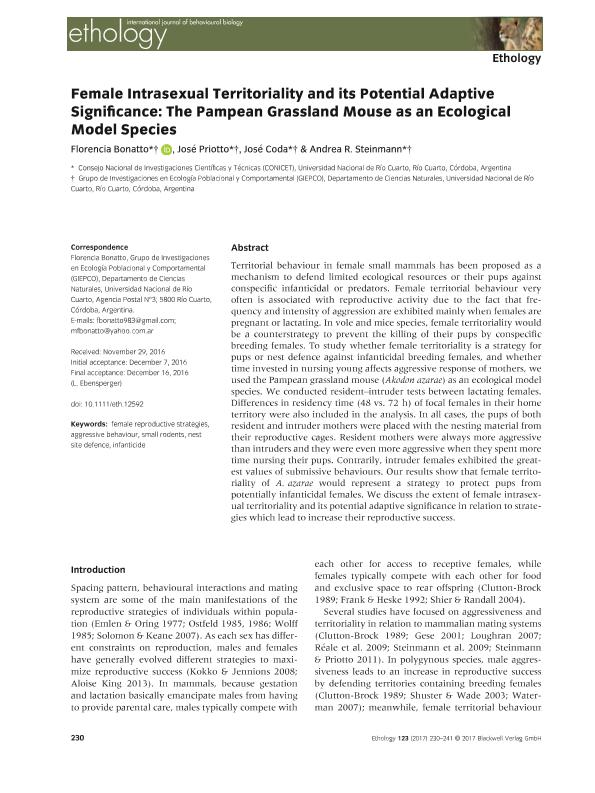Artículo
Female Intrasexual Territoriality and its Potential Adaptive Significance: The Pampean Grassland Mouse as an Ecological Model Species
Fecha de publicación:
03/2017
Editorial:
Wiley Blackwell Publishing, Inc
Revista:
Ethology
ISSN:
0179-1613
Idioma:
Inglés
Tipo de recurso:
Artículo publicado
Clasificación temática:
Resumen
Territorial behaviour in female small mammals has been proposed as a mechanism to defend limited ecological resources or their pups against conspecific infanticidal or predators. Female territorial behaviour very often is associated with reproductive activity due to the fact that frequency and intensity of aggression are exhibited mainly when females are pregnant or lactating. In vole and mice species, female territoriality would be a counterstrategy to prevent the killing of their pups by conspecific breeding females. To study whether female territoriality is a strategy for pups or nest defence against infanticidal breeding females, and whether time invested in nursing young affects aggressive response of mothers, we used the Pampean grassland mouse (Akodon azarae) as an ecological model species. We conducted resident–intruder tests between lactating females. Differences in residency time (48 vs. 72 h) of focal females in their home territory were also included in the analysis. In all cases, the pups of both resident and intruder mothers were placed with the nesting material from their reproductive cages. Resident mothers were always more aggressive than intruders and they were even more aggressive when they spent more time nursing their pups. Contrarily, intruder females exhibited the greatest values of submissive behaviours. Our results show that female territoriality of A. azarae would represent a strategy to protect pups from potentially infanticidal females. We discuss the extent of female intrasexual territoriality and its potential adaptive significance in relation to strategies which lead to increase their reproductive success.
Archivos asociados
Licencia
Identificadores
Colecciones
Articulos(CCT - CORDOBA)
Articulos de CTRO.CIENTIFICO TECNOL.CONICET - CORDOBA
Articulos de CTRO.CIENTIFICO TECNOL.CONICET - CORDOBA
Citación
Bonatto, Maria Florencia; Priotto, Jose Waldemar; Coda, José Antonio; Steinmann, Andrea Rosa; Female Intrasexual Territoriality and its Potential Adaptive Significance: The Pampean Grassland Mouse as an Ecological Model Species; Wiley Blackwell Publishing, Inc; Ethology; 123; 3; 3-2017; 230-241
Compartir
Altmétricas




